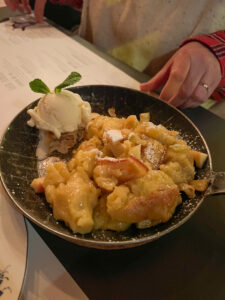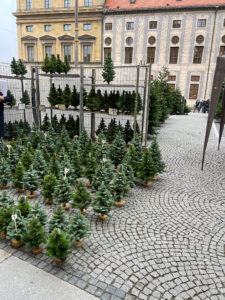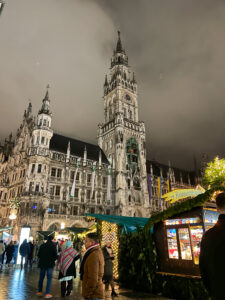
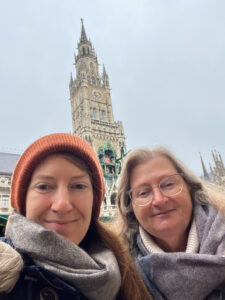
The travel mishap on the way to Munich wasn’t our fault. Or I suppose it WAS our fault for not knowing German, but sadly my German knowledge is limited to the word for “dog.” On our early train from Prague to Munich, the train stopped in a small town in Germany, and an announcement came over the train speakers. Most people stood and got off the train, but not everyone did, and we weren’t sure what was happening. When we asked those around us who had remained on the train if they knew what was going on, we realized that only the people who didn’t understand German had stayed. The rest of us slowly trickled out of the train, and I found a train attendant several cars down who explained that there was railway work between that stop and the next one and that a bus would be taking everyone between the two stations. But when the non-German-speaking group of us made it to the bus, the angry driver gestured that the bus was full and drove away leaving us standing there. It started to snow.
The station was tiny—just one room with a little convenience store/café and a small restaurant attached. There was no ticket booth and there were no railway workers. No one working in the café or restaurant knew any information about the train. No one knew if another bus was coming or if the bus that left us would come back. There were probably 20 or so of us, and we huddled together under an awning, hoping a bus would show up. After half an hour, some people started looking up the option to Uber to the next station. The group of us moved inside and sat in the small hallway. An hour and a half later, another bus finally showed up for us, entirely unannounced. If we hadn’t been sending a lookout outside every few minutes, we would have missed it. At the next station, no one directed us which train to get on, and there weren’t signs letting us know. Our group scattered with people getting on trains going in opposite directions. We took a guess and hoped we were right, and luckily, we were. It was a very odd first impression of what I envisioned would be a country of efficiency and order.

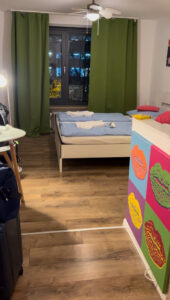
It was nearly dark by the time we arrived in Munich. We walked to our Airbnb—perhaps the strangest Airbnb of my trip. It was inside a hotel but independently owned by an individual. When I say it was inside a hotel, I mean that we entered into the hotel lobby and passed by the check-in desk and took the elevator to our floor of hotel rooms. We punched our key code into the lock, and we were in our hotel room that…wasn’t a hotel room? The décor was confusing. The oddly placed art was confusing. It was a perplexing situation, but it was comfortable enough for our brief stay.
We had one full day in Munich the next day to explore the Christmas markets, so we packed in as many as we could. Munich is a big city, and it felt like there was a different Christmas market for every interest. In the Main Square, the gothic Town Hall towered over the traditional market below, full of ornaments, stuffed animals, crafts, and nativity scenes. The market dates all the way back to the 14th century, and it’s one of the most popular in Europe. It was nearly freezing, and we stumbled around the market with stiff legs and numb fingers in spite of our gloves. Just outside the square was the Food Market featuring booth after booth of foods from around the world and a beer garden, and if the weather had been warmer, we would have sampled some snacks. Instead, we went to seek shelter and found a cozy café for lunch. My mom got potato soup and I got a salad with “pretzel dumpling croutons,” which sound like 3 different foods to me but was incredibly good.

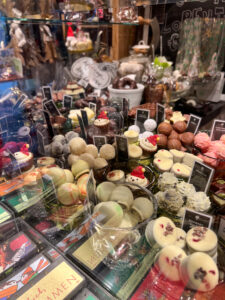


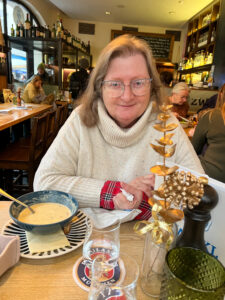
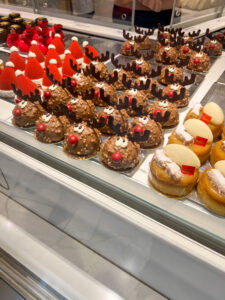
A ten-minute-walk away, we found the Medieval Market. Merchants wore their cloaks and historical costumes in their wooden huts. There were events planned throughout the week—knights, Renaissance dance circles, a falconer, jesters—and drink specials with names like “dragon’s blood.” It was part-Renaissance Fair and part Christmas Market. I don’t know if it was entirely accurate to what was happening in Munich in medieval times, but it was very cute.
The market I was most excited to see was the Fairytale Bazaar. The name is a little misleading—it’s less of a fairy tale vibe and more what I’d describe as a Bohemian, steampunk, circus vibe. We took a bus to get there, and the market was set up in a series of big tents (circus style). Walking into each of the tents was like wandering into different parties. There were live musical performances and food booths and crafts interspersed throughout. It felt less Christmas-y than the other markets and also like something that would exist back home in New Orleans amid my arts and circus pals. (In fact, why doesn’t this exist in New Orleans?)
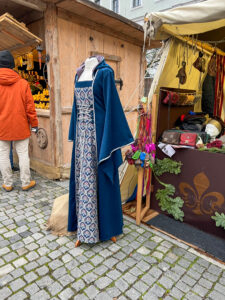

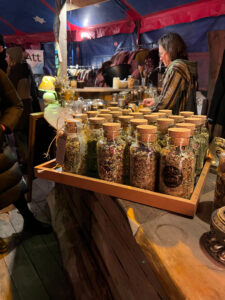
Munich is a great place for people who aren’t as enchanted by traditional markets as, say, I am. There are several more popular alternative markets that we didn’t get to visit like the Pink Market (organized by the LGBTQ community and featuring all pink lights), the Winter Festival (like Oktoberfest but in winter), and even a Christmas market at the airport.
Before heading back to our room, we got dinner at a place the Airbnb host suggested to us and that we didn’t realize was fancy until we got there. We were too tired and cold to go anywhere else, so we ended the night with fish over prosecco-risotto and a sinful apple dessert, and yet again Bavaria proved to have delicious food.
It’s criminal to only spend two nights in Germany on a Christmas-market tour, but we had to head to Salzburg the next day to prepare for the most exciting event of our European Christmas Market Journey—Krampus Night.

